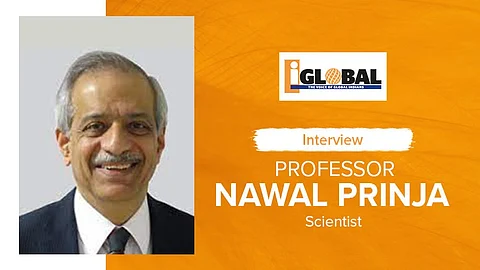

World renowned UK-based academic Professor Nawal K. Prinja is a nuclear physicist and an advisor to the government on nuclear policy. As well as working with the World Nuclear Association, Prof. Prinja holds honorary professorships from four universities across the UK.
Against the backdrop of his recent involvement with the Manchester Museum’s South Asian Gallery, iGlobal caught up with the Global Indian scientist on his efforts to highlight India’s rich tradition of science and innovation and also to discuss the confluence of science and Hindu scriptures.
“My grandfather would say: ‘yes learn English, learn sciences, but don’t forget that you also have to learn Sanskrit and read our scriptures’,” recalls Prof. Prinja.
The simultaneous study of Hindu literature and physics has enabled Prof. Prinja – who graduated in aeronautics from the prestigious Indian Institution of Technology (IIT) in India - to observe the parallels between ancient Vedic philosophy and mind-boggling concepts in physics such as quantum mechanics.
“The more I study, the more I get convinced that there is no contradiction between Hinduism and science. During the lockdown, I revisited the six shastras, or the six schools of philosophy. Every time I read them, I discover things and I say ‘wow’ – that’s the same as what we talk about in our sciences!
MORE LIKE THIS…
“Whether you are talking about very basic sciences like gravity or laws of thermodynamics, which state that energy cannot be created or destroyed, it simply changes its form. That is a fundamental philosophy of Hinduism.”
Prof. Prinja has also advised the government of India on multiple occasions that it is imperative that those who learn the sciences learn Sanskrit and Hindu literature alongside it, and vice versa.
“If science students in India had learnt Sanskrit and had come to know about the philosophy, then their thinking would’ve changed slightly. And who knows, maybe that would have meant that the discovery of the god particle might have happened in India rather than in the west,” he explains, emphasising the point further.
MORE LIKE THIS…
Prof. Prinja’s immense passion about Hinduism can be seen reflected in various aspects of the work he does within the community too. Recently he featured in BBC Radio 4’s show ‘Beyond Belief’ wherein he discussed the startling similarities between Hindu thought and physics alongside Professor Brain Cox. As well as teaching GCSE Hinduism and Sikhism, Vedic maths and Upanishads in the Manchester based organisation called Vedic Organisation for Indian Education and Culture, Prof. Prinja was more recently involved with the curation of Manchester Museum’s South Asian Gallery, regarding which he expressed some misgivings.
“It was an opportunity for young people of South Asian decent to learn about their heritage, which has existed even before several countries like Pakistan, Bangladesh etcetera were created. The gallery mostly gives a very modern view of the heritage – which is fine too – but the whole point of a museum is to teach people about the things they wouldn’t know!”
While on the curation team, Prof. Prinja’s focus centred primarily around science, innovation and language.
MORE LIKE THIS…
“The main idea was to tell the visitor that India isn’t a third world country. There is a rich tradition of education, research and science and innovation. Sanskrit is one of the languages which is the oldest in the world and has the most scientifically correct grammar. Many other languages we use today, including English, have derived from it.